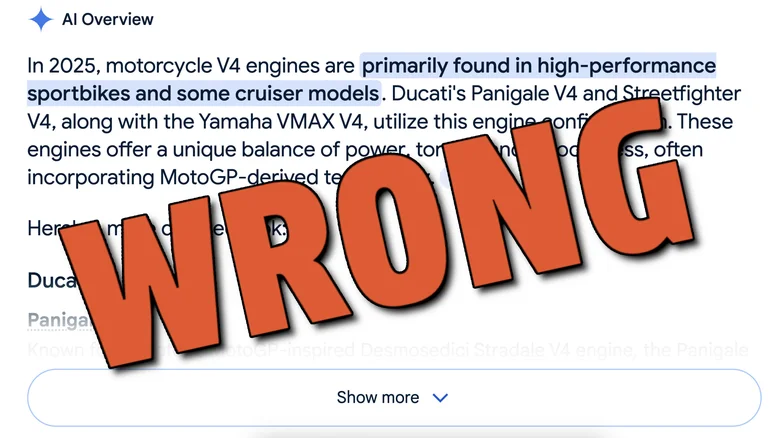Parcel delivery firm DPD have replaced their customer service chat with an AI robot thing. It’s utterly useless at answering any queries, and when asked, it happily produced a poem about how terrible they are as a company. It also swore at me. 😂 pic.twitter.com/vjWlrIP3wn
— Ashley Beauchamp (@ashbeauchamp) January 18, 2024
It’s hard to scroll through your feed these days without bumping into something that feels… off. Maybe it’s an image of a celebrity doing something they’d never do, or a video of a motorcycle that doesn’t exist, or perhaps a song that sounds like your favorite artist but the lyrics are just plain weird. Welcome to the world of “AI Slop” — the term that’s quickly becoming shorthand for the flood of low-quality, AI-generated content that’s clogging up the internet. And while it’s often laugh-out-loud funny, there’s a darker side to this digital deluge that’s no joke at all.
You might have caught wind of this phenomenon from none other than John Oliver, who dedicated an entire episode of Last Week Tonight to dissecting AI Slop on June 22. As The Guardian reported, Oliver took a complex issue and made it both accessible and hilarious, complete with absurd examples like a “cabbage Hulk” and AI-generated Eminem lyrics that were so nonsensical they had the audience roaring. But as funny as it was, Oliver’s segment underscored a key point: AI Slop has become so pervasive that it’s now a mainstream punchline. And if something’s serious enough to be made fun of on national TV, you know it’s worth paying attention to.
Now, before diving in further, let’s first understand what exactly is ‘AI Slop’. One of the main things to watch out for is low-quality, mass-produced media that lacks human effort, logic, or any real purpose. Think of it as the digital equivalent of spam or junk mail. The text often gives itself away with a robotic overuse of phrases like “in today’s rapidly evolving landscape,” “when it comes to,” or the ever-popular “delve.” P.S. Another major giveaway is the excessive use of “em-dashes,” but frankly this AI trait has left many writers, including myself, always thinking twice before using our beloved em-dashes.
That said, it’s what some have called “cohesion without coherence,” which is when the words are arranged in grammatically correct sentences, but they’re repetitive and devoid of any real insight. Visually, it manifests as images of “Shrimp Jesus” on Facebook, non-existent flowers being sold to gardeners, or a poster for the classic film 12 Angry Men featuring 19 smudged-face figures. I’m no mathematician, but something there doesn’t add up. For those interested, the Wikipedia page for ‘AI Slop’ has more details and examples to check out.
But let’s not get too bogged down in definitions. The real story here is how AI Slop is everywhere, and why it’s both a joke and a problem. Take, for instance, the fake motorcycle YouTube channels that have been popping up. Jalopnik dug into this mess, revealing channels like “Bike Culture Hub” that churn out videos with AI-voiced narration and images of bikes that don’t exist — or, in some cases, hallucinate updates for real bikes that never happened. It’s all very convincing until you realize the stats are made up and the names are mispronounced. The funny (or messed up) part, however, is that Google’s AI has been caught citing these channels as factual sources in search results. Talk about a snake eating its own tail! This isn’t just funny; it’s a glaring example of how AI Slop can muddy the waters of truth online.
This erosion of trust is a huge problem. It makes it harder to tell real news from fabricated junk, and in a crisis, this digital noise can drown out real-time pleas for help on social media, potentially hindering rescue efforts. For actual human artists and writers, it’s an economic nightmare. How can you compete when the internet is flooded with content that costs nothing to produce? Some people who are frustrated have even taken to Reddit suggesting that ‘AI Slop’ should be “bannable.” But I feel like that would be a questionable path with a very fine line between ‘AI Slop’ and something that some might consider interesting.
While all this is pretty serious, we can’t help but laugh too. There’s a dark humor to be found in AI’s failures, in the “uncanny valley” where its attempts to mimic humanity fall short in bizarre ways. We chuckle at the AI-generated art with six-fingered humans or buildings growing out of mountains because it’s a comforting reminder of the machine’s artifice. The internet is full of these comedic fails, such as a delivery company’s chatbot that started swearing at a customer.
Similarly, New York City’s official AI chatbot advised a small business to break the law. Then John Oliver himself also highlighted this absurdity with a clip of an AI-generated Eminem rapping nonsensical lyrics.
Gizmodo flagged how even ASMR videos which are meant to soothe, are getting the AI treatment, with weird scenes like women eating molten rock on waffles or someone eating a milk jug that turns to ice cream. It’s like AI’s trying to prank us, and honestly, I’m here for it sometimes.
Guys I hate to say it but the AI ASMR is only getting better pic.twitter.com/q1DoZXWfLc
— Justine Moore (@venturetwins) June 24, 2025
And this is just the beginning. We’re about to see a massive boost in AI Slop on X too, thanks to Perplexity. The platform recently opened up video generation to users on X. Needless to say, the spam began immediately. You can check out a whole thread of videos below:
Video generation is now available on Ask Perplexity! 🎥
— Ask Perplexity (@AskPerplexity) June 19, 2025
Tag us with your best prompt and let your creativity run wild
pic.twitter.com/OOYQ4WzGip
Interestingly, research suggests that when we find out a joke or piece of art was made by AI, it actually boosts our confidence in our own creativity. It’s a psychological defense mechanism, a way of asserting our human superiority in the face of machines that are getting smarter, but not that smart. Sometimes, this evolves into new forms of culture. A trend called “Italian Brainrot” has emerged on social media, where users intentionally embrace the weird, “overly realistic look” of AI visuals, building a shared universe around characters with incoherent backstories. The joke is the artificiality itself.
This whole mess is fueled by a simple, powerful force: money. As reported by PPC Land, platforms like TikTok, Meta, YouTube, and X have monetization programs that reward views and engagement above all else. This inherently incentivizes the mass production of content, quality be damned. Tech giants are leaning into this, with Meta’s Mark Zuckerberg announcing a vision of “infinite creative,” where AI systems replace human ad agencies. This has given rise to global content farming operations that use AI to translate and re-upload viral videos for profit.
Google’s new “AI Mode,” which aims to replace traditional search results with a single, AI-generated answer, could make things even worse for creators. While it might be convenient for users, some warn it could be an “SEO apocalypse,” devastating the traffic that publishers and independent creators rely on to survive. It threatens to turn the open web into a “walled garden,” where a few big tech companies control the flow of information.
That said, users are getting wise. Some have been hitting the “Not Interested” on YouTube to train algorithms, as folks on Reddit’s PartneredYoutube suggest. Platforms might step up too — Gizmodo says YouTube’s eyeing an “AI Slop Button” to filter this stuff out. Legally, the heat’s on. The BBC’s threatening to sue AI firms like Perplexity for swiping content, and laws like South Dakota’s deepfake labeling bill are popping up.
Here’s my take: AI Slop’s a double-edged sword. It’s funny — sometimes I can’t help but chuckle at the absurdity. But it’s also a wake-up call. We need to get smarter about spotting it, and platforms need to stop rewarding quantity over quality. Digital literacy is key as well, knowing what’s AI trash versus human gold. Because if we don’t sort this out, we’ll be wading through a swamp of fake bikes and six-fingered freaks forever.
Next time you see some bizarre AI creation, laugh if you want. I will. But maybe also ask, “What’s really going on here?” In the age of AI Slop, the joke’s on us, and we’ve got to figure out how to laugh without losing the plot.
Featured image generated using AI
TechIssuesToday primarily focuses on publishing 'breaking' or 'exclusive' tech news. This means, we are usually the first news website on the whole Internet to highlight the topics we cover daily. So far, our stories have been picked up by many mainstream technology publications like The Verge, Macrumors, Forbes, etc. To know more, head here.



